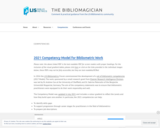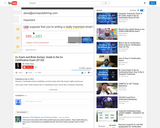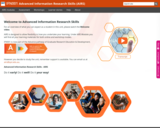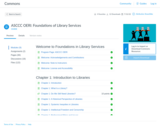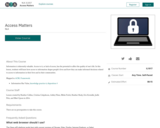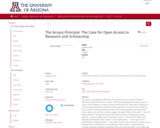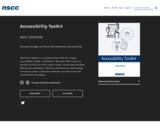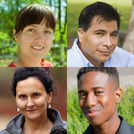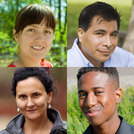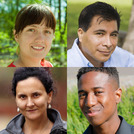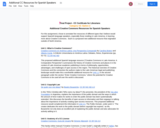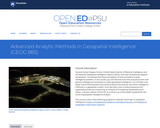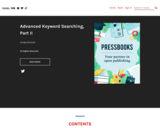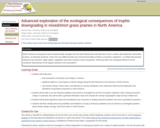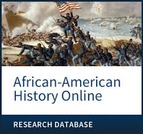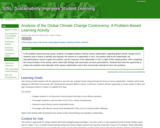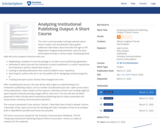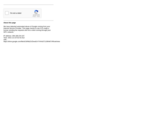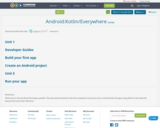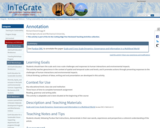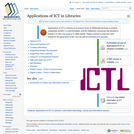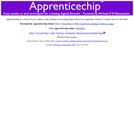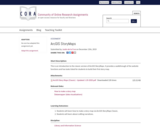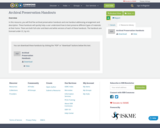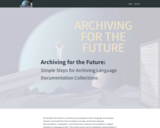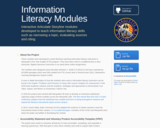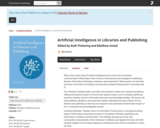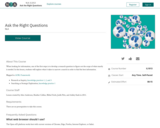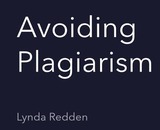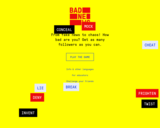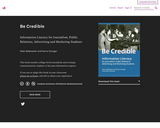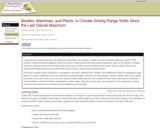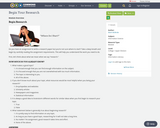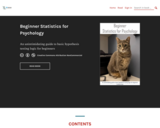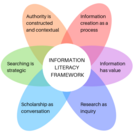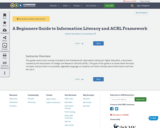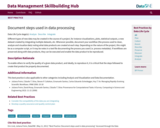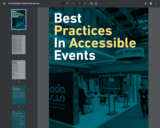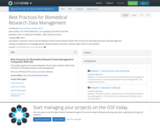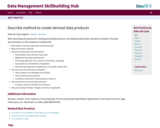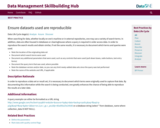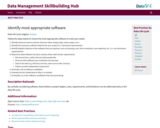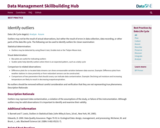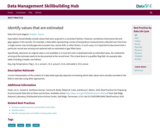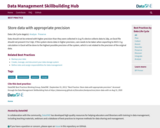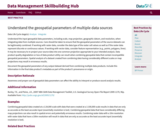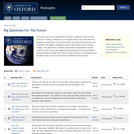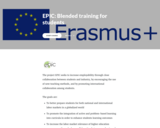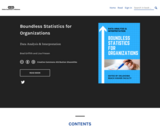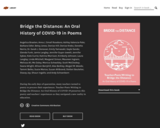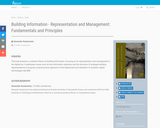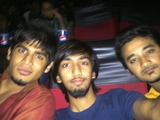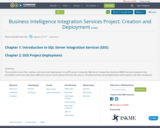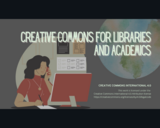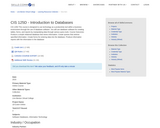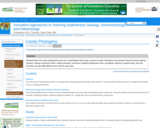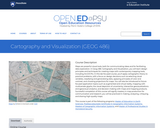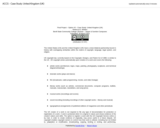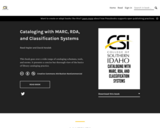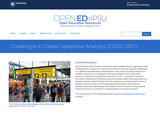Begin Research“Where Do I Start?”Do you have an assignment to write a research paper but you’re not sure where to start? Take a deep breath and begin by carefully reading the assignment requirements. This will help you understand the work you need to do.First, let’s think about what we mean when we say “research.”HOW MUCH DO YOU ALREADY KNOW?What makes a good topic?It is broad enough that you can find enough information on the subject.It is focused enough that you are not overwhelmed with too much information.The topic is interesting to you.All of the above.If you don’t know much about your topic, what resources would be most helpful when you being your research?Encyclopedias and websitesScholarly articlesNewspapers and magazinesStatistical informationIt is always a good idea to brainstorm different words for similar ideas when you first begin to research your topic.TrueFalseWhat statement below is generally true about beginning research?It is pretty easy to find information on any topic.As long as you have a good topic, researching for it will not take a long time.No matter t he assignment, good research takes time and effort.None of the above.ANSWERSAll of the above.2.1True4.3Read Your Assignment CarefullyBefore you can even begin your research, though, you need to read the assignment instructions carefully—more than once! This will help you understand the work you need to do.Highlight topic guidelines, required length, and the types of information sources allowed.Let’s take a look at a sample assignment.UNDERSTAND YOUR ASSIGNMENTLily is taking a University Studies class and must complete this assignment:In this paper, you will analyze the scientific aspects of a known environmental problem and identify and discuss at least two proposed solutions.Now, analyze this assignment step by step.Find the words that tell you what to do (think verbs!): analyze, identify, and discuss.Find the limits of the assignment: scientific aspects and two proposed solutions.Find the key theme: a known environmental problemBy reading the assignment carefully, we know that Lily has to analyze an environmental problem and identify and discuss at least two proposed solutions.Pick a Good TopicLily’s assignment is broad enough to give her some choices when picking a topic. So, what makes a good topic?It interests you! You’ll enjoy it and do a better job.It meets the requirements of your assignment.It’s broad enough to give you several search options.It’s focused enough that you’re not overwhelmed with information.HOT TIP!Explore the library’s databases to get you started.Browse newspapers and news sources.Talk to your instructors and fellow students.Consult with a librarian.TOO BROAD, TOO NARROW, OR JUST RIGHT?Air pollution in urban areasToo broadToo narrowJust rightRespiratory diseases in children in high-density urban areasToo broadToo narrowJust rightEnvironmental consequences of California’s October 2007 forest firesToo broadToo narrowJust rightPolar bear adaptation to global warming in the ArcticToo broadToo narrowJust rightRenewable energy in the United StatesToo broadToo narrowJust rightThe design and implementation of Cal-Cars—the California Cars InitiativeToo broadToo narrowJust rightANSWERSToo broad. You’d need to identify an aspect of air pollution to narrow down the scopeJust right! This is a good topic. You’ll continue to refine your ideas as you learn more about the topic.A bit narrow. It will be hard to find information on just one event. Look more broadly for information on forest fires in California or the West.Just right. There should be just enough information to get you started. You will continue to refine your ideas as you learn more about the topic.Too broad. This is a good starting place, but you’d want to focus the topic by selecting a specific renewable energy like solar power or wind.Too narrow. It’s going to be difficult to find information on such a narrow topic. Broaden the focus to look at initiatives like this one that are less regional.Identify Potential IdeasNow it’s time to really focus your topic. Browse a few resources for ideas and identify different aspects of the topic.Remember, if you pick a subject that interests you, you’ll enjoy the research process much more!Customize Your TopicLet’s say your assignment is to research an environmental issue. This is a broad starting point, which is a normal first step.One way to customize your topic is to consider how different disciplines approach the same topic in different ways. For example, here’s how your broad topic of “environmental issues” might be approached from different perspectives.Social Sciences: Economics of Using Wind to Produce Energy in the United StatesSciences: Impact of Climate Change on the Habitat of Desert Animals in ArizonaArts and Humanities: Analysis of the Rhetoric of Environmental Protest LiteratureTurn Your Topic into a QuestionWhen you’ve chosen a topic, it’s time to ask some questions. Using “environmental issues” as our general research interest, let’s ask some questions about environmental issues and agriculture.How: How do government agricultural subsidies impact the price of food? How does the use of pesticides affect food safety?Who: Consumers, farmers, farm workersWhat: Food safety, pesticides, food prices, genetically modified food, organic farmingWhere: United States, developing nations, European UnionWhy: Why does the European Union ban the sale and distribution of genetically modified food?What’s Your Angle?Let’s say that the most interesting question that emerged from the last exercise was: “How does repeated pesticide use in agriculture impact soil and groundwater pollution?”Find Your KeywordsNow that we have our sample research question, we need to identify the key concepts and their related keywords.Using our research question, “How does repeated pesticide use in agriculture impact soil and groundwater pollution?” we might consider these keywords:A SYMPHONY OF SYNONYMSLet’s examine our research question again:How does repeated pesticide use in agriculture impact soil and groundwater pollution?Now analyze this assignment step by step:Find important words and phrases that describe this topic (you can ignore common words that don’t have a lot of meaning, such as prepositions, articles, and adjectives): pesticide, agriculture, soil, and pollution.Now, think of some synonyms for the keywords you found:pesticideagrochemicals, pest management, weed management,diazinan, malathionagriculturefarming, food crops, specific types of cropssoilclay, organic componentsgroundwater watershed, water resources, water table, aquaticspollutionenvironmental impact, degradation, exposure, acid rainWhy are synonyms necessary? You’ll often need to search for different words relating to the same concept.Dive Into a Sea of Resources!Browse through general sources to get familiar with your topic. You will find many sources for locating background information. Remember our point from earlier in this tutorial: the source you select will determine what you find. Make sure you spend your time looking in the right places.HOT TIP!Is there enough info on your topic? If not, review the earlier steps for starting your research. It’s normal to refine and revise your topic multiple times.What Do You Know?Once you’ve established your focused topic, you need to get familiar with it by doing some reading. Start with more general sources and then work up to more specific and detailed sources. Where you go next depends on how much you know.So, just how much do you know about your topic?Not All That MuchI’ve Got the BasicsI’m Ready for DetailsSounds like you need the type of information typically found in encyclopedias and websites.Sounds like you’ve got a basic understanding of your topic and just need to learn more. Check out books, magazines, and newspapers.Specific information is what you need. You’ll want to find relevant scholarly articles, statistical sources, and government publications.Matching Resources to Your Information NeedNewspaper: Current regional or local informationScholarly journal article: Detailed analysis of a complex problem.Book or book chapter: Summary of what is known about a topic.Encyclopedia or website: Factual information like names, dates, and definitions.TEST YOURSELF: WHAT HAVE YOU LEARNED?What are the characteristics of a good topic?(Select all that apply) It interests you.It meets the requirements of your assignment.It’s broad enough to give you several search options.It’s focused enough that you’re not overwhelmed with information.Rank the following questions in order from most general to most specific (1 being the most general):Are pesticides bad?Do video games cause violent behavior in adolescent males?Are agricultural workers in Mexico at a higher risk of health problems due to pesticide exposure because of lax government safety standards?Is there a relationship between fast food consumption and obesity?What is the best way to focus your topic?Think about the discipline that you are researching for.Tailor your topic to the requirements of your assignment.Talk to a librarian about the resources that are available for your topic.All of the above.Pick the best set of keywords to begin searching for information on global warming.Rising ocean levels, air pollution, greenhouse gasesBiodiversity, atmospheric temperature, ozone layerGlobal climate change, greenhouse effect, atmospheric carbon dioxideEnvironment sustainability, alternative energy, biofuelsWhy is it a good idea to use different words to describe similar ideas when you are beginning research?(Select all that apply) Because there is only one right answer and you can find it by trial and error.Because using different words will help you cast a broader net than just using the same term over and over.Different researchers might use different terms to describe the same idea.You might spell some of the words wrong and not get any results.What is the most difficult aspect of beginning to research a topic that you don’t know very much about?You don’t know enough about the topic to know what is important and what is not.You don’t understand the technical aspects of the topic.It takes a lot of time to do research.All of the above.For you, what the most difficult part about beginning your research?ANSWERSA good topic will incorporate all these characteristics.1 = Are pesticides bad?2 = Is there a relationship between fast food consumption and obesity?3 = Do video games cause violent behavior in adolescent males?4 = Are agricultural workers in Mexico at a higher risk of health problems due to pesticide exposure because of lax government safety standards?The more a research question incorporates the concepts of Who, What, When, Where, Why, and How the more specific it will be.All of the above.4.3; think carefully about which terms are closely related to global warming.5.2 and 5.3; there may be many ways to describe a single topic. Using as many related words as possible will help you find the most information!All of the above; remember that research takes time and energy and isn’t an easy thing to do!No matter what, coming to the library and talking to a librarian will help you get started. Finding information effectively and efficientlyLevel 2 teaches you how to structure a search for the information you need to write a paper, for example. You will learn the following:how to construct a search strategy using the aspects defined in level 1how to perform a smart search using the information sources available at TU Delft LibraryDetermining search termsNow it is time to do an actual search! In level 1 you divided the search topic into its different aspects. What’s next? Are you going to use Google and type in all the aspects, like you probably do every day? What will you do with all the search results? Are you going to study them all? No, there is a smarter way!Exercise 1Plug in your earphones or turn down the volume and watch the clip ‘Web Search Strategies Explained in Plain English‘ by Commoncraft about smart searching on the web.Searching the web is very similar to searching other information sources such as Worldcat Discovery. Doing the following exercise will teach you how to apply the aspects of your search topic in a smart search. Complete the exercise on how to find suitable search terms matching the aspects of the search topic. Determining search strategyNow you are going to convert the synonyms you have found into a smart search strategy. You have to use search operators to use all the synonyms properly.Exercise 2Study the TUlib module Search operators.If you want to perform a smart search, you must combine your search terms. Complete thisexercise on combining search terms with Boolean operators.Towards information sourcesNow you have formulated a search strategy, which you will use to search the various information sources. But where to start? How do you choose which information source you want to use? This table gives an overview of the differences between Worldcat Discovery, Scopus and Google Scholar and helps you determine when to use each one.Exercise 3Watch the first two sections (“Basic searching” and “Retrieving documents”) of this video about searching in WorldCat Discovery (which includes the TU Delft Library catalogue).Watch this video with an example of a search strategy carried out in article database Scopus.Complete the exercise on carrying out your search strategy in various information sources.Now you have learned how to convert the aspects of your search topic into a search strategy and how to apply this strategy in a number of information sources.You can find other relevant information sources for your subject area in the “Useful links” overview in the section “What’s next”.
